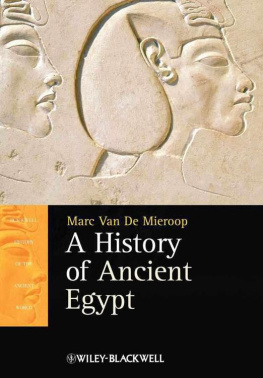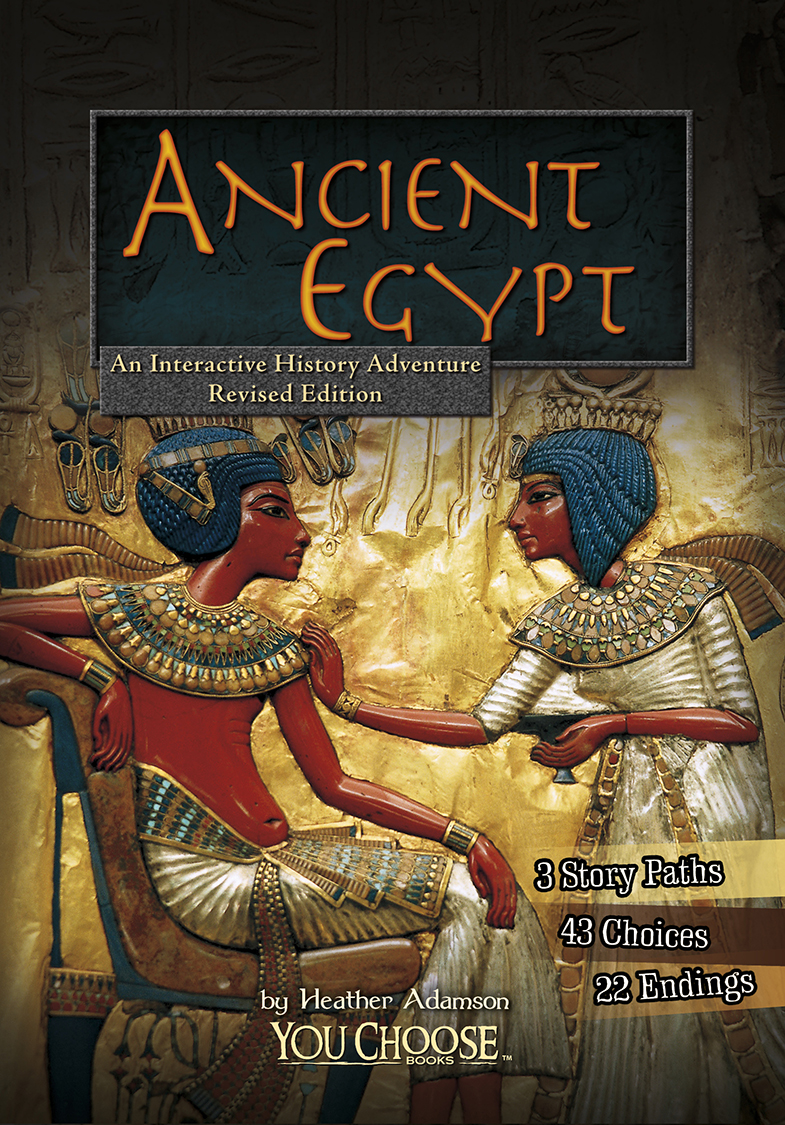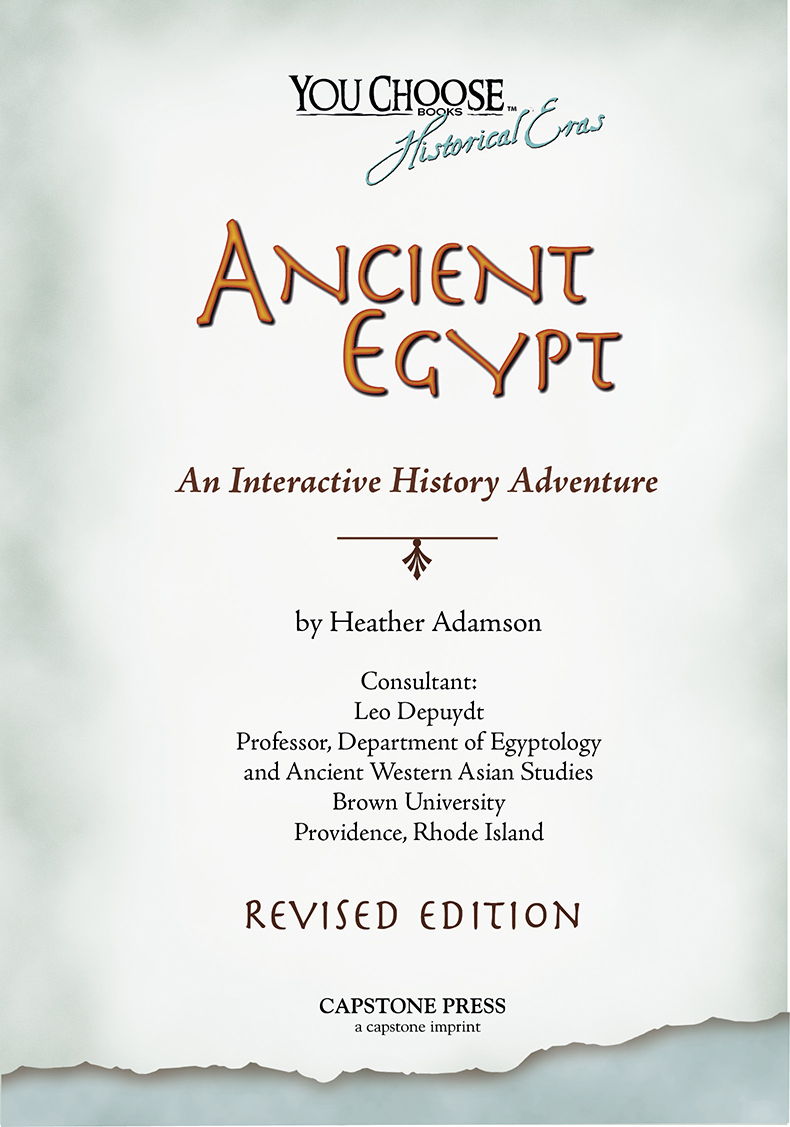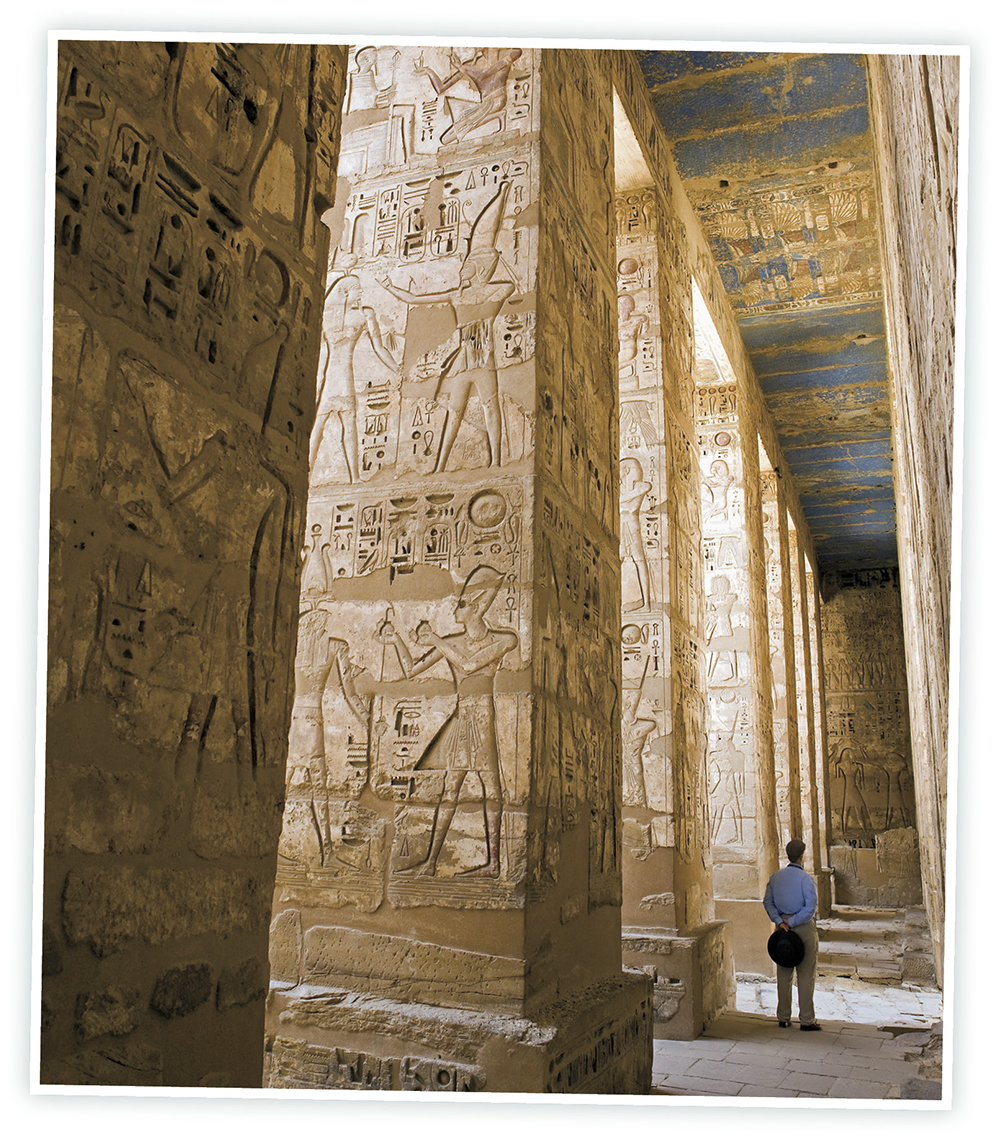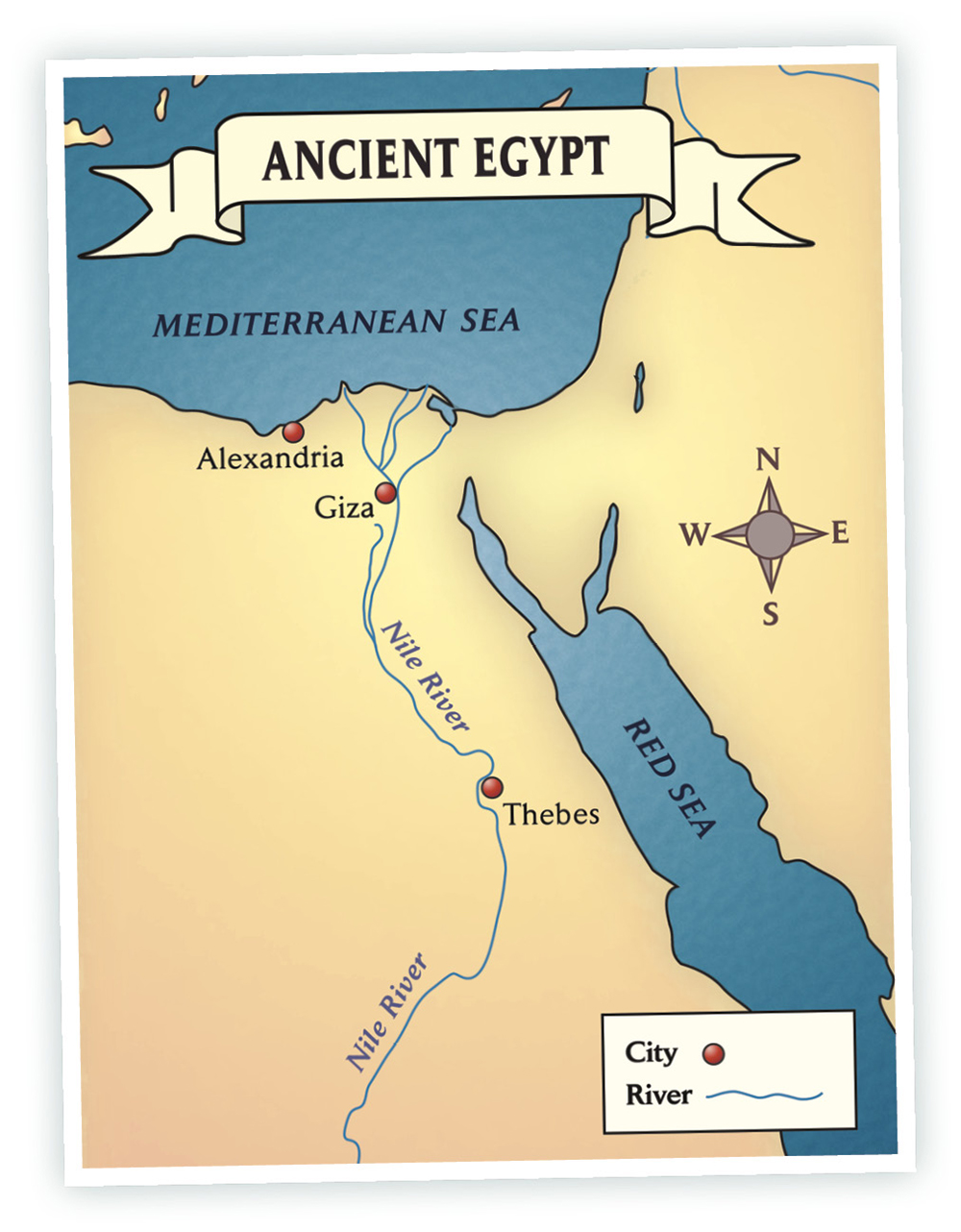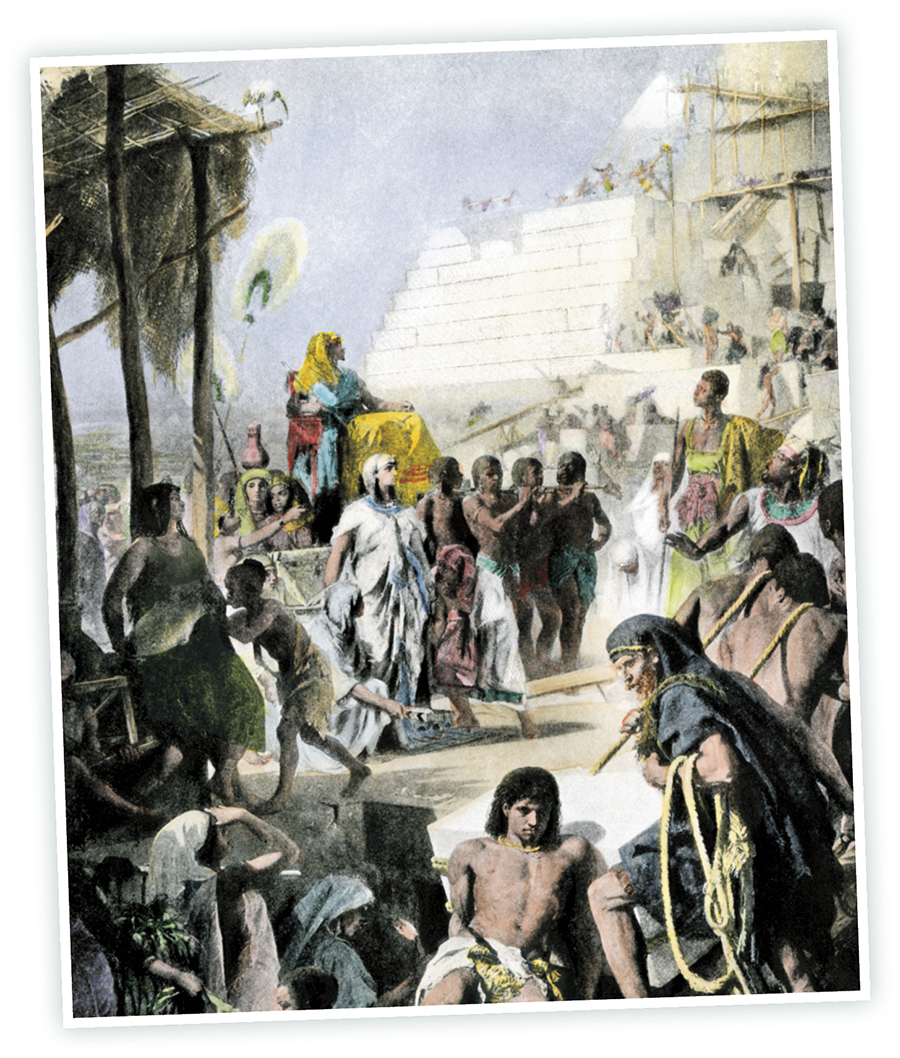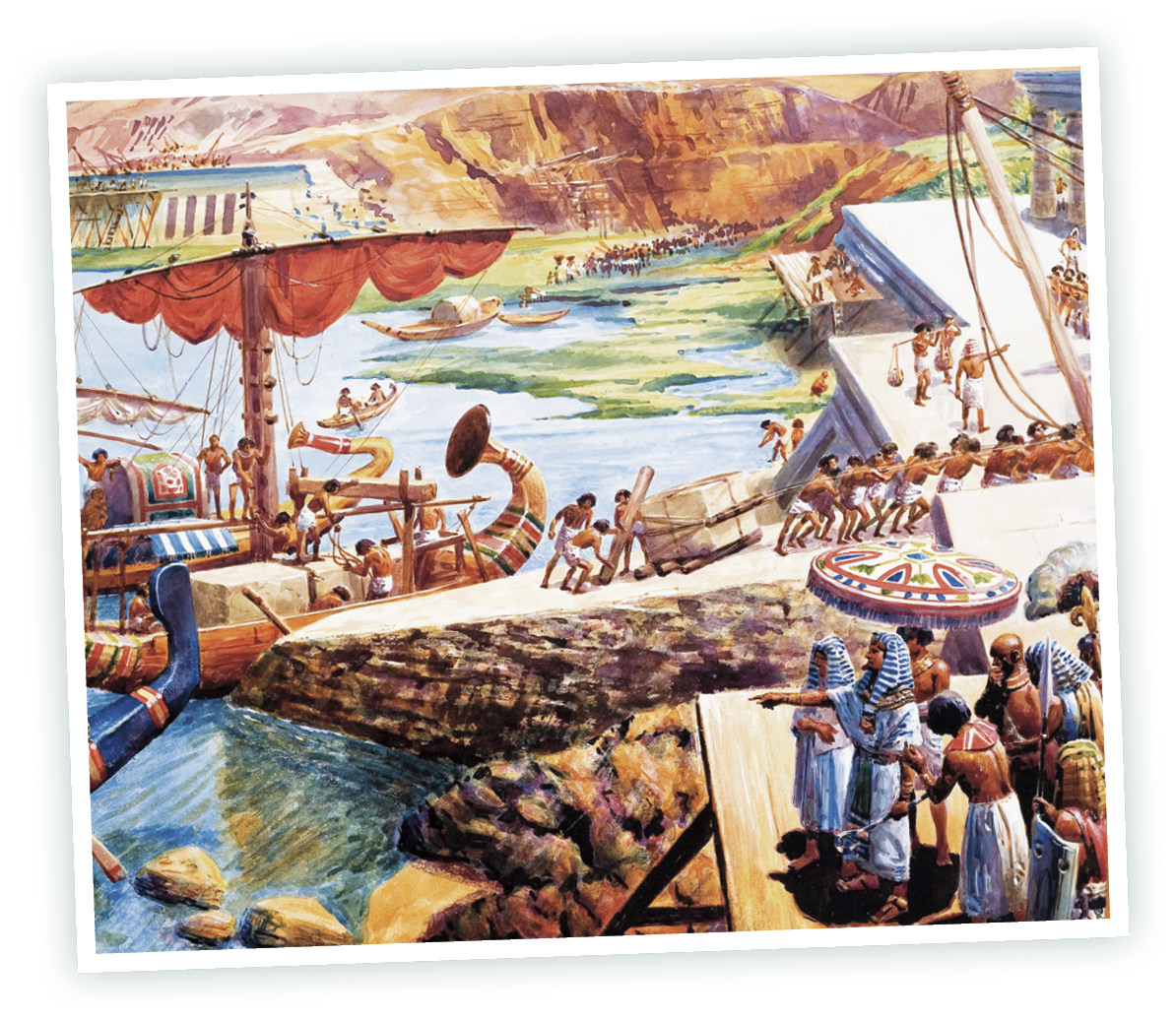For the best You Choose experience,
view in portrait (vertical) orientation.
ABOUT YOUR ADVENTURE
YOU live in a time of breathtaking wealth and backbreaking labor. Will you experience ancient Egypt during the age of the pyramid builders, the mummy makers, or Queen Cleopatra?
In this book, youll explore how the choices people made meant the difference between life and death. The events youll experience happened to real people.
Chapter One sets the scene. Then you choose which path to read. Follow the links at the bottom of each page as you read the stories. The decisions you make will change your outcome. After you finish one path, go back and read the others for new perspectives and more adventures. Use your device's back buttons or page navigation to jump back to your last choice.
YOU CHOOSE the path you take through history.
CHAPTER 1
The Gift of the Nile
Ancient Egypt was an era ahead of its time. Artists built magnificent buildings to honor the , was widely used. A strong army protected ancient Egypts massive wealth.
The Nile River was the lifeblood of ancient Egypt. Most ancient Egyptians were farmers. They depended on the annual Nile flood to grow crops such as wheat and barley. When the Nile flooded, harvests were plentiful. When the Nile didnt flood, the people of Egypt starved.
Ancient Egyptians built temples to worship their kings and the gods. Some temples still stand today.
Neighboring kingdoms wanted the Niles power for themselves. Over the years, foreign rulers from Nubia, Syria, Persia, Greece, and Rome each had a turn controlling Egypt.
Just as the ancient Egyptians needed the Nile for physical survival, they needed the gods for spiritual survival. They believed in life after death. A proper burial was just as important as a good life. People worshipped the gods at home and in temples. The pharaoh was considered a living god. The pharaoh owned Egypt, including the land, its people, and all their possessions. Some pharaohs built large tombs called pyramids.
Life in ancient Egypt was hard. Many people died from accidents or disease. Soldiers fought and died protecting Egypts borders. Workers toiled in the hot desert sun building monuments and tombs for royalty. Women often died during childbirth. People who lived past age 35 were considered old.
But the ancient Egyptians also enjoyed life. People attended parties and celebrations honoring the gods. They enjoyed music and dancing. Wealthy children attended school. Children and adults played games and spent time together.
Appearance was very important to the ancient Egyptians. Men and women often shaved their heads to stay clean. Wealthier men and women wore wigs made of vegetable fibers or human hair. Both men and women wore eye paint. Most clothes were made of linen. Linen was lightweight and comfortable in the hot climate. Children often wore no clothes at all.
The historical era known as ancient Egypt began around 3100 BC. It ended in 30 BC, when Rome took over Egypt. Ancient Egypt was a time filled with adventure and mystery. The desert sands both preserve and hide secrets of the past. What will your journey to ancient Egypt reveal?
CHAPTER 2
The Pyramid Builders
Its 2550 BC. King Khufu has ordered the construction of his pyramid tomb at a town called Giza. Khufu wants his pyramid to outshine all earlier pyramids. Khufus father, King Snefru, built three pyramids. But one of them is sinking into the desert sands. Khufus builders must avoid repeating past mistakes in order to honor Khufu and secure his place in the afterlife. It would be amazing to be associated with Khufus pyramid in any way.
King Khufu often inspected the construction of his pyramid.
Its the season of akhet, when the Nile floods its banks. It will be months before it is peret, planting season. And it will be even longer until shemu, harvest season.
Akhet is the perfect time to bring in supplies and temporary workers for Khufus pyramid. A group of skilled workers already lives in Giza. With the river flooded, a harbor now lies just outside of Giza. Boatloads of cedar logs and copper tools are sailing in from Lebanon, Syria, and the Sinai Desert. Khufus nephew Hemiunu is in charge of the construction. He will keep the work moving.
You live on a small family farm on the edge of the fertile land near the Nile River. Its the season of akhet. Canals hold back the water. When the river crests, the water flows down the canals to all the fields. The fields sit underwater for a season. Then the water recedes and leaves perfect soil for growing crops. Just inches beyond the green land, the desert sand piles up.
Your father speaks to you one morning after breakfast. Our family has not contributed any laborers to Khufus pyramid. I want you to go there and honor our family.
You have never been out of your village, but you are glad to go. Pyramid workers are greatly respected. You board a boat and travel to Giza.
When you arrive at the Giza harbor, it is a sight beyond belief. Thousands of people are working on this enormous building project. The rapping of chisels on stone and workers shouting is an odd musical sound. You stare in awe at the pyramid. The lower part is already complete. Each side is 756 feet long.
You climb onto the dock and find the workers unloading the ship. Where do I go to sign up for work? you ask.
Go into the workers city, one of the men tells you. Someone there will get you started. You thank him and walk to the workers city. There are many tiny mud-brick homes and shops. Thick smoke billows from several bakeries and pottery shops. There is also a large bunker where temporary workers can sleep. You find the royal administration building and sign up for work.
You are excited when you learn about the rations. You will earn bread and beer each day. You can trade your extra rations for items in the city. Since you have no stonecutting skills, you are assigned to move the large blocks.
The ancient Egyptians were skilled shipbuilders. They used the Nile River to travel.
The limestone quarry is just south of the pyramid. You get up early each morning and walk to the quarry. You usually walk with Amosis. He also came from a farm. He reminds you of your brothers.




